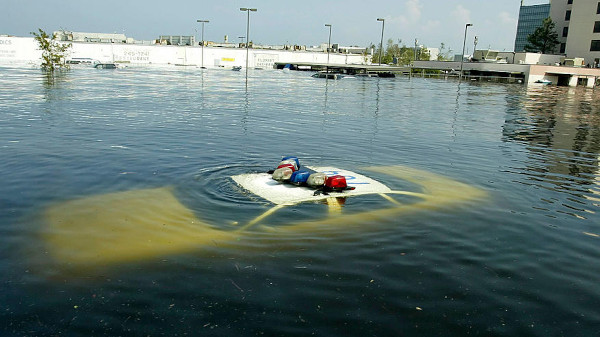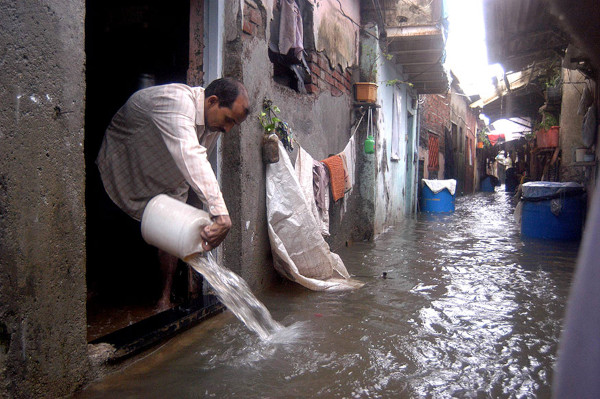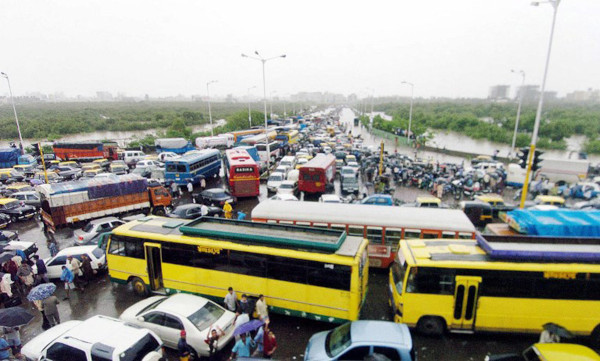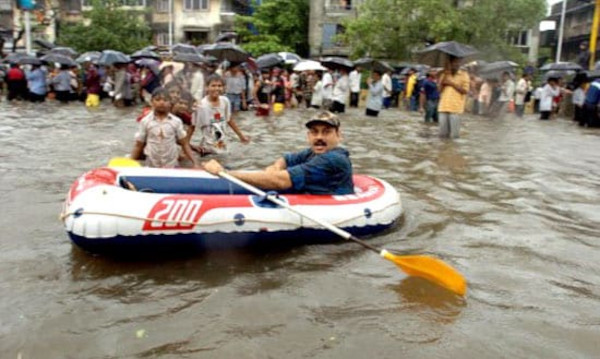Mumbai Deluge in 2005

M. P. Vasudevan hails from a small village in Kannur district of Kerala state. After post-graduation in Zoology he worked on a research project at the University of Calicut that was aided by the Swiss Government. He joined the Central Board of Excise & Customs (CBEC) as a Preventive Officer through the Staff Selection Commission (SSC) exam. He started at Goa Customs in 1981 and was then sent to Mumbai Customs on deputation in 1988. He got his first promotion in 1996 and became Assistant Commissioner in 2014. He retired on superannuation in June 2015. Post-retirement he devotes most of his time to maintaining his website www.referencer.in which serves as a reference library for both tax officers and tax payers under Government of India.
On 6th August, 2020 the India Meteorological Department recorded 332 mm rain in the span of 24 hours in Mumbai, the heaviest one-day rain in August in 47 years.
That day of torrential rain in Mumbai took me back to the unprecedented rain and deluge of 2005 when hundreds of people had lost their lives. Many had choked to death sitting inside their submerged cars in the flood water while a few others had drowned. 944 mm rain in the span of 24 hours on the 26th July 2005 was said to be the heaviest rain in Mumbai day rain during the last 100 years.
I was posted in Mumbai for customs clearance of export goods at Sahar Air Cargo Complex. My office was just 1.5 km away from the flat where we were put-up. Just walking distance. I had come home for lunch. There was hardly any work pressure due to the rainy season. Otherwise also majority of the clearance processes were happening at night as most of the International flights took off at night. Only two of us were on duty for the day shift. More Officers were posted during the night – the second shift.
While going back after lunch there was one or two feet water on the roads leading to Sahar Road. I could drive but slowly. My 'Padmini', an old 1978 model Premier Padmini, was getting pressure of the water flowing against it Luckily it didn't stop on the way. I reached the office gate. The gate complex was on a higher level than the road running between the gate and the office building. I stopped my car on the side of the gate and got out. The CISF security guards at the gate didn't object as it was raining heavily.
I could see water logging near the steps going up to my office. I kept waiting at the gate complex for the water to recede. I didn't want to get wet and work with the wet clothes on. I was looking at the steps in front of the office. Within minutes the water level covered the second step, then the third and was still rising every second. I reckoned that it was no use staying on in office as I was not expecting anyone to turn up for work and decided to return home.
I don't know what made me call home and tell my wife to ring up the school to request them to keep our younger son Chanchal, in the school itself till we reached to collect him. I also guided Chethan, the elder one to go and stay with a friend. She could complete both the tasks before the telephone lines and mobile networks went dead.
There was no question of driving my Padmini back home. I left it near the gate complex and started walking. Main road was flooded but was still walk able. When I entered the small side road leading towards my colony water level reached my chest level. The road had become an angry river. At places water was flowing ferociously at very high speed.

Mumbai rains 2005: submerged cars.
Good Samaritans from the locality had tied ropes connecting the electric poles to save people from drowning. There were a few here and there yelling, “Don’t go that side, it is deep, come this way, etc”.
Roads had already turned into big craters and ditches as the surface asphalt was eaten away by the ferociously flowing water. It took more than one hour for me to reach my colony. I can't say whether I was walking or swimming. At least six-seven people had reportedly died in the stretch which I had covered safely. Fully drenched and shivering, I reached my colony.
My colony was on higher plateau than all other colonies in the locality. Even then there was two to three feet deep water in the compound. Water had gone into all the lift pits as well. Electricity meter were also submerged in water. Good that the supply of electricity was shut down much before by the Authorities to avoid incidents of electrocution.
When I reached our colony my wife was standing at the building entrance waiting for me. In our building the ground floor is stilt parking thus nobody was living on the ground floor. It was a big relief. There was knee deep water in the compound around the building. However, the parking area had only one foot water as it was a little higher than the surroundings.
Hundreds of cars parked in the stilt and basement parking in the colonies in the locality were reportedly damaged. Ground floor of the bungalow in front was flooded and the occupants had climbed to the first floor along with the essentials. Similarly ground floor of all adjacent buildings was under water and people had virtually gone to stay on the staircases.

Mumbai rains 2005: flooded ground floor homes.
We both kept standing in the car parking in the hope of getting some information about the flood situation outside from the neighbours returning to the colony. There was no other way to get any news or information on the deluge - no electricity, no TV, no radio, no telephone. Hapless and cut off we were from the rest of the world and even the neighborhood. The only news source was the neighbours who had just returned from outside. They brought news of chaos and death. Really frightening!
Both my children could not come home. Chethan, who had gone to IIT Powai on some assignment, but could reach a friend's place in the nearby Hiranandani Complex. Chanchal stayed on in the school. There was no contact with both during the day.
When it started getting dark we climbed up to our flat on the third floor. We could not eat or sleep in the night thinking of our children stranded outside. The night for the first time seemed so long. I have done so many night duties but never had such a long night in my life.
At around 5.30 am we set out to fetch our younger son from his school. Don't know whether he could get food or a place to sleep. This was the very first instance he was away for a night. Being a child with special needs we had never left him with others for even a single night.
His school, St. Teresa’s Special School at Santa Cruz is almost seven-eight kilometers away. We were hoping that we might get an auto-rickshaw to go and come back. Water had retreated from our locality. We started walking. Interior roads were all in very bad shape. Most of the asphalt was taken away by the flood water and here and there deep craters had developed. Some were three-four feet deep. Water had mostly receded as our neighborhood was not a flood prone area. However, there was no trace of an auto or taxi on the road. We continued walking in the hope that we might find an auto on the highway.
We reached the highway. It was really a different scene there. The Western Express Highway an eight lane ever bustling State Highway was looking like a battlefield after the cease-fire. Abandoned vehicles of different types, sizes, shapes and colours were strewn and scattered all over. Some were heading south, some north, another east and others west and so on. Some were locked while others were open. A few had climbed on the meridian as well.

Mumbai rains 2005: road leading to Sahar airport.
Only the flyovers had the vehicles parked in line. The driver's might have tried to take a turn and couldn't have got enough space to move forward or backward or turn away to any side. Later on it took more than a month for the Traffic Police and their cranes to clear these vehicles from the highway. In that scenario how would we get an auto-rickshaw or taxi? We continued walking. There was no other way in any case. There were many other people walking just like us.
The road till the domestic airport was fairly dry. Thereafter it passed through low lying areas. We were walking in almost four to five feet deep water - dirty and muddy. Further down south Kalina area had reportedly seen 10 to 15 feet of water. The flood water had scaled up to the second floor in that area.
Naval speed boats had to be pressed into action to rescue people stranded on the second and third floors of their houses. Passengers on a double decker bus were stuck on the upper deck were also brought to safety by the Navy.

Mumbai rains 2005: a rubber dinghy on a waterlogged street.
Crossing Milan Subway we reached SV Road on the western side. SV Road was having knee deep water throughout - it somehow seemed cleaner though. Walking in the water is fraught with danger. We didn’t know whether there was any open manhole or ditch or gutter. Holding each other's hands tightly we walked slowly and steadily spading through the water. It must have taken more than three hours to cover the distance of seven to eight kilometers.
We reached the school and found Chanchal happily waiting for us. His teachers were all around. The convent adjoining the school had provided them food and room for sleeping. Seeing us shivering in our wet clothes one of the Sisters brought hot coffee for us. It was so tasty and relaxing. Those children who had gone in the autos or vans were stuck on the road for almost 24 hours. The drivers did not leave them till the parents reached their location traversing the normal route taken by them as there was no communication.
We started our journey back home. Now, all three of us were holding hands and walking through the knee deep water. Incidentally, on the SV Road we saw so many local people serving free tea and biscuits/snacks to those wading through the flood water.
I saw some good Samaritans asking people, "Sir anyone wants to use the toilet?" Oh really great, humanity is not lost! They knew that these people were walking through the flood water from the previous evening and some might want to use the toilet in the morning hours. People were ready to allow their toilets to be used by complete strangers. An appreciable gesture indeed. Only Mumbaikars can do it.
The three of us reached home walking for another three hours. Chanchal was walking for such a long distance for the first time. We were under great tension till we reached. He was walking happily through the flood water though he had some bruises on his legs. At around noon we were back home hugely relieved. Chethan could return home only by the evening.
We can't forget this episode in the whole life.
Comments
Mumbai and peak rain don't mix
Quite a story. Lucky that you had no major problems. What is clear is that Mumbai's system cannot handle heavy, concentrated rainfall - and that Mumbaikars can handle it.
Add new comment